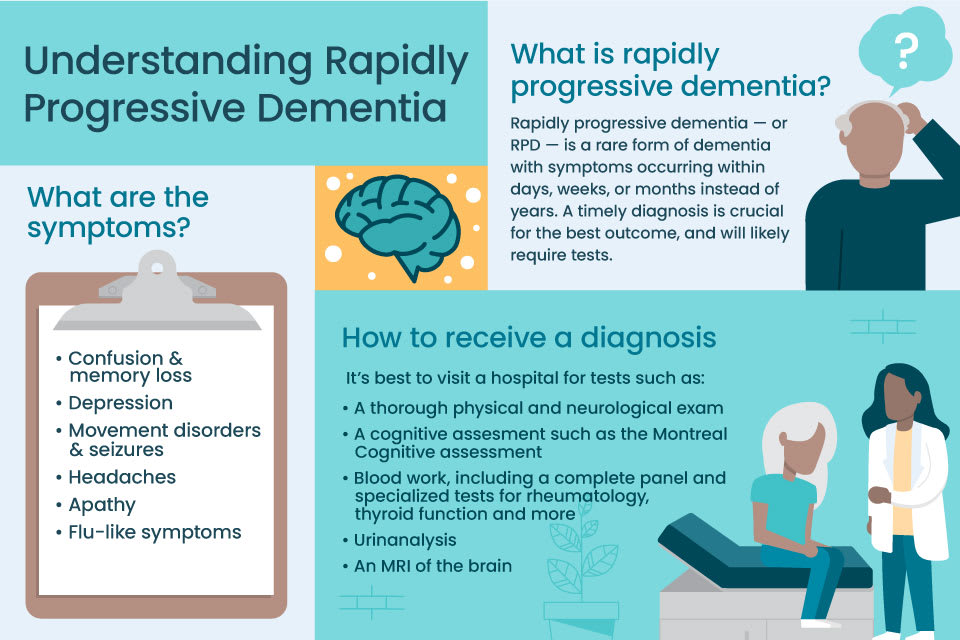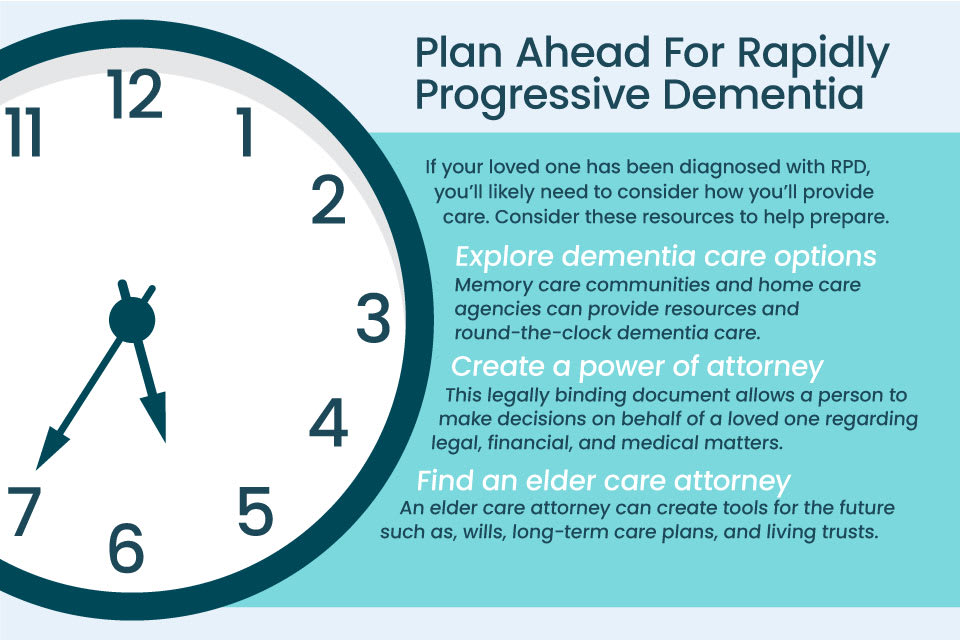
Rapidly Progressive Dementia: Reasons for a Sudden Worsening of Dementia Symptoms

Rapid-onset dementia, or rapidly progressive dementia (RPD), is a severe form of dementia where symptoms appear suddenly within weeks or months, rather than gradually over multiple years like most cases of dementia. RPD can be caused by a wide range of conditions, including infections and autoimmune disorders. And, RPD is rare and can sometimes be difficult to diagnose.
Find out what conditions can cause RPD, whether RPD is reversible, and how to seek the best care for your loved one.
Let our care assessment guide you
Our free tool provides options, advice, and next steps based on your unique situation.
Defining rapid onset dementia
If you notice a sudden onset of dementia symptoms in your loved one, it’s important to see a doctor right away. RPD has many causes, and an accurate diagnosis early on can help secure the best possible outcome for your loved one. RPD can be fatal in certain cases, but research suggests that, depending on the cause, it may be a treatable condition.
What are the symptoms of sudden onset dementia?
Rapidly progressive dementia symptoms develop over the course of weeks or months. Depending on the underlying condition, noticeable symptoms may include [01]:
- Poor judgment and difficulties making decisions
- Difficulties solving problems
- Memory loss
- Depression
- Movement disorders
- Headaches
- Apathy
- Seizures
- Flu-like symptoms
- Confusion
- Insomnia and/or excessive sleepiness during the day
What can cause rapid onset dementia?

- Vascular — Reduced blood flow to the brain. For example, a senior who has a stroke might later have a sudden onset of dementia symptoms.
- Infectious — Viral, bacterial, and fungal infections that cause brain inflammation [03], like HIV, herpes, syphilis, and others.
- Toxic-metabolic — Vitamin and mineral deficiencies like B12, B1, niacin, or folate, and toxicities related to lithium, mercury, and bismuth.
- Autoimmune — Diseases like lupus, Hashimoto’s disease [04], and other conditions.
- Metastases/Neoplasm — Cancerous growths in the central nervous system (CNS), primary CNS lymphoma, adrenal disease, and other places.
- Iatrogenic — Disorders accidentally caused by a physician, such as adverse drug reactions, contamination, or negative effects of medical procedures. [05]
- Neurodegenerative — Rare conditions like Creutzfeldt-Jakob disease (CJD), corticobasal degeneration, and other neurodegenerative diseases.
- Systemic — Disorders that affect the body as a whole, rather than a single part or organ of the body. [06]
What causes dementia to progress quickly?
If your loved one has been diagnosed with Alzheimer’s or another form of dementia, you’ve probably prepared yourself to witness a more gradual cognitive decline. Seeing a sudden increase in dementia symptoms or RPD can be cause for concern.
Though, sometimes, dementia may seem to come on suddenly simply because you recently noticed your parent’s dementia symptoms in a new light. For example, if a dementia patient suddenly can’t walk, consider that it may not be a sudden symptom. They may have had a hard time with their mobility or balance long before losing the ability to walk.

Let our care assessment guide you
Our free tool provides options, advice, and next steps based on your unique situation.
Can dementia get worse suddenly?
Even with an Alzheimer’s diagnosis, it’s much more likely that your loved one’s quick onset of dementia symptoms are caused by another treatable condition. Sometimes, urinary tract infections and pneumonia can cause delirium, making a dementia patient’s symptoms worse. [02]
Delirium can be caused by many things and can be easily mistaken for rapid-onset dementia in otherwise healthy seniors. In many cases, this delirium is reversible when the cause is treated. [07]
Lewy body dementia (LBD) patients can experience a sudden decline. This kind of dementia is more rapid than Alzheimer’s disease, with more symptoms presenting initially and with patients experiencing a more marked decline.
Rapid onset dementia: life expectancy
In conditions with RPD, you may wonder: How fast can dementia progress? More common dementias take years. With fast-progressing dementia, however, the timeline is much shorter. RPD manifests within weeks or months. In some cases, symptoms may even appear over the course of a few days.
Along with the speed of progression, another common concern is the life expectancy of someone with RPD. This is highly variable on the person and the type of dementia they’ve been diagnosed with. For instance, if rapid-onset dementia is due to a prion disease like the rare Creutzfeldt-Jakob disease (CJD), then life expectancy may only be 6-8 months. Other forms of RPD may have a similar life expectancy if the cause of the RPD has not been identified.
How is RPD diagnosed?
A sudden onset of dementia symptoms in an elderly loved one warrants immediate medical attention, usually in a hospital setting. Ruling out other conditions to arrive at an RPD diagnosis can be difficult. In general, to diagnose RPD, you should expect the following from a medical team:
- A thorough physical and neurological exam
- A cognitive assessment such as the Montreal Cognitive Assessment
- Blood work, including a complete panel and specialized tests for rheumatology, thyroid function, and more [08]
- Urinanalysis
- An MRI of the brain
Depending on test results, doctors will order more tests until they can gather an accurate diagnosis. The faster your loved one’s care team arrives at a diagnosis, the better their outcome. If RPD is not diagnosed quickly, damage can be permanent. And, if RPD is not caused by something reversible, there’s often no cure.[09]

Talk with a Senior Living Advisor
Our advisors help 300,000 families each year find the right senior care for their loved ones.
Dementia, rapid decline, and care needs

To make your loved one’s life easier, you may want to consider home care. Staying in a familiar environment is often comforting but can require an extra set of hands as your loved one’s dementia progresses. Although, moving into a memory care community can offer your loved one the opportunity to work with a group of specialized caregivers in an intentionally designed, soothing environment.
You’ll likely need to consider how you’ll provide care, and what to do when your loved one can’t make the decisions surrounding their care. Consider these helpful resources:
- A Beginner’s Guide to Power of Attorney for Elderly Parents
- 6 Ways an Elder Care Attorney Can Help Family Caregivers
- Memory Care Help for Families: Surprising Ways to Pay for Care
- How to Talk to Your Parent About Moving to Memory Care
If you’re not sure what kind of care your loved one may need after an RPD diagnosis, you can always contact one of A Place for Mom’s Senior Living Advisors. They’ll take into account your loved one’s care needs, preferences, and other circumstances in order to help locate timely care that will keep your loved one comfortable and give you peace of mind.
Paterson, R. W., Takada, L. T., & Geschwind, M. D. (2012, September). Diagnosis and treatment of rapidly progressive dementias. Neurology Clinical Practice.
Geschwind, M. D., Haman, A., & Miller, B. L. (2007, August). Rapidly progressive dementia. Neurologic Clinics.
Mount Sinai. Systemic.
Mocellin, R., Walterfang, M., & Velakoulis, D. (2007). Hashimoto’s encephalopathy: Epidemiology, pathogenesis and management. CNS Drugs.
Krishnan, N. R., & Kasthuri, A. S. (2005, January). Iatrogenic disorders. Medical Journal Armed Forces India.
Mount Sinai. Systemic.
Fong, T. G., Tulebaev, S. R., & Inouye, S. K. (2009, April). Delirium in elderly adults: Diagnosis, prevention and treatment. Nature Reviews Neurology.
Memory and Aging Center Weill Institute for Neurosciences University of California, San Francisco. Rapidly progressive dementia workup.
Memory and Aging Center Weill Institute for Neurosciences University of California, San Francisco. Rapidly progressive dementias.
Senior living options in all states
The information contained on this page is for informational purposes only and is not intended to constitute medical, legal or financial advice or create a professional relationship between A Place for Mom and the reader. Always seek the advice of your health care provider, attorney or financial advisor with respect to any particular matter, and do not act or refrain from acting on the basis of anything you have read on this site. Links to third-party websites are only for the convenience of the reader; A Place for Mom does not endorse the contents of the third-party sites.
Make the best senior care decision
Make the best senior care decision